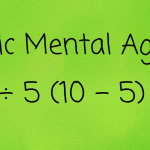No One Can Solve This Deceptive Math Problem And It’s Driving The Internet Wild
Are you ready to put your math skills to the test? There's a new problem that's been circulating the internet and it's stumping even the most seasoned mathematicians. This deceptive math problem has been driving people wild and it's time to see if you have what it takes to solve it.
The problem involves a series of equations that seem simple enough at first glance. However, as you dive deeper into the problem, you'll quickly realize that things aren't as straightforward as they seem. The problem has been shared on social media and has quickly gone viral, with people from all over the world trying to solve it.
So, what makes this math problem so tricky? Well, for starters, it requires a deep understanding of algebra and order of operations. You'll need to be able to identify patterns and use logic to work your way through the equations. But even if you're a math whiz, this problem is sure to give you a run for your money.
But don't worry, you're not alone in your quest to solve this problem. People from all over the world are working together to crack the code and find the solution. There are even online forums and groups dedicated to discussing the problem and sharing tips and tricks for solving it.
So, are you ready to take on the challenge? Put your math skills to the test and see if you can solve this deceptive math problem that's driving the internet wild.
1.What is the deceptive math problem that's driving the internet wild?
The deceptive math problem is a viral puzzle that has been circulating on social media platforms. It involves a series of equations that seem simple at first glance, but the answer is not what it appears to be. Many people have attempted to solve the problem, but so far, no one has been able to crack it.
2.Why is the deceptive math problem so difficult to solve?
The deceptive math problem is designed to trick people into making a common mistake. The equations are structured in a way that leads people to assume that they should perform a certain operation, when in fact, they should be doing something else entirely. This type of puzzle is known as a "red herring," and it's a common tactic used in brain teasers and riddles.
3.Is there a solution to the deceptive math problem?
Yes, there is a solution to the deceptive math problem, but it's not easy to find. Some people have claimed to have solved the puzzle, but their answers have been disputed by others. The creator of the puzzle has not released an official solution, so it's unclear whether anyone has actually cracked the code. However, many people are still trying to solve the problem, and it's become a popular topic of discussion on social media.





